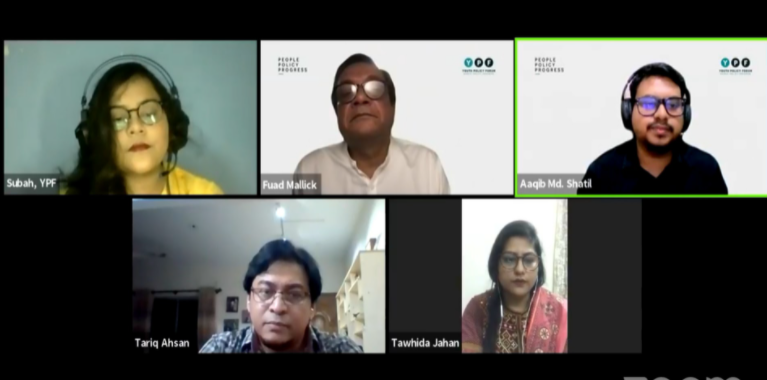Written by: Mashrefa Tarannum
The Youth Policy Forum launched its Road to Reforms (RtR) series to prepare a youth-led reform matrix for a paradigm shift in Bangladesh. Under the series, the YPF education network organized the webinar styled “Towards a new social contract: Progressive education for a knowledge-based society” last week.
Dr. Fuad Hasan Mallick, a senior fellow of YPF environment network alongside Dr. M. Tariq Ahsan, Professor in the Institute of Education & Research (IER), University of Dhaka, was present as the keynote speaker in the discussion. They were also joined by Md Awlad Hossain Sharker, Head Teacher, Kazi Mofiz Uddin High School, Narsingdi. The event was moderated by Tawhida Jahan, who is also a YPF fellow in Gender and Inclusion.
Subah Binte Ahsan, the coordinator of the YPF education network, presented a few research findings highlighting our national education situation in the pandemic period before the discussion.
Bangladesh is the only country in South Asia where these institutions were not opened even once during the pandemic. Classes were broadcasted on Sangsad TV and radio, and to some extent, through zoom and google classroom. But as Bangladesh was not technologically prepared for this, distance learning didn’t go according to the plan. According to a study by CAMPE, nearly 69.5 percent of the primary and secondary students did not attend distance learning classes through any media.
Md. Awlad Hossain shared his real-life struggle as a teacher amidst this pandemic. Pandemic-induced poverty is the most critical problem in his area. “I’m afraid around 30% of my students might not get back to school because covid has changed their livelihood completely. Many of them became the victim of child marriage and child labor.” Besides, lack of accessibility to smart devices and internet connectivity are two issues that need serious attention. Although his school continued their classes online, many of the students could not attend because they didn’t have any device or because their internet speed was too low to connect to zoom.
Addressing the drop out issues, Dr. M. Ahsan discussed that we didn’t address the problem smartly. He said, “A proper geographical mapping was needed on the outset of covid outbreak. An alternative modality of education should have been created by now which we failed to deliver unfortunately. ”
He added that many countries introduced family and community based learning approaches as students cannot attend schools physically. This should have been followed by our policymakers considering our economic and societal context.
Dr. M. Ahsan also addressed our assessment problem. According to him, assessment by assignment was a very creative approach, but it failed to deliver its purpose. As the decisions have been made centrally, they failed to consider the local and regional context.
When Tawhida Zaman questioned Dr. Fuad about reopening schools and the chances of students getting infected for not maintaining minimum social distance, he discussed our comparative advantage in weather. We do not have any extreme weather situations, so we can easily expand our classroom size according to our needs.
Dr. Fuad Hasan Mallick shed light on a different issue. The budgetary allocation for education in our country is not adequate compared with those of other South Asian and developing countries that put education at the top of the policy agenda. He said, “We must increase our budget for the education sector. Our teacher’s salary should also be increased. China increased their salary of teachers by 10 times. Bangladesh should also follow this to some extent to revamp the system and quality education.”
As for solutions or possible ways out of this problem, Dr. M. Ahsan emphasized on few things. First of all, a blended learning approach is the way forward for the current situation and future days. Blended learning is an approach that is made up of in-person classroom time and studying online, while outdoor education refers to organized educational activities that take place outdoors. With this, community and context-based learning methods need to be introduced, especially in our rural areas.
“We need a pedagogical shift in our current system”, Dr. Ahsan added. Our teachers are not very adaptive to technological intervention in their teaching method. He also suggested, “For those who were never given a chance in education and who will be dropped out of the covid-19 crisis and are less to come back in the education stream, we must implement an alternative system. We cannot expect a holistic change unless we design a target-oriented education approach for marginalized students. Internet speed should also be improved.
Lastly, keeping a positive mindset, Dr. M Ahsan said, “The situation is not as we expect it to be, but I am very hopeful about our young people. Bangladesh has come a long way since its beginning, and it can go far if we act smartly and efficiently. As our curriculum is being redesigned, we can be sure that it will open many doors in the future.
The opinion of Dr. Fuad resonated with Dr. Ahsan. He suggested that the covid-induced poverty situation should be addressed from the very root of the problem itself. Providing one-time financial assistance can be useful as a short term solution, but it will never sustain the long run. He also added that as mothers directly influence their children, they should be encouraged and empowered enough to participate in their child’s education.
